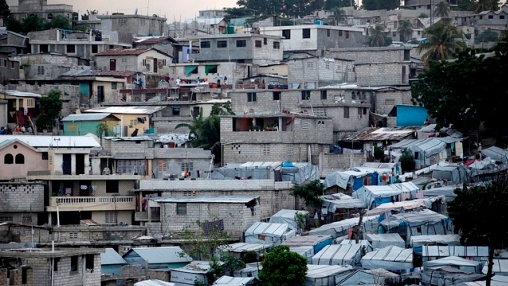Challenge
In the aftermath of the January 2010 earthquake in Haiti, there was a lack of clarity on a lead housing institution and no clear policy framework to support the neighborhood and housing reconstruction of the country. The reconstruction process in the first years after the earthquake was more affected by institutional challenges (such as the lack of clear recovery policies) than by technical challenges (such as the selection of a shelter design). Many of the technical problems identified resulted from the lack of direction and coordination, which meant numerous (and sometimes inexperienced) agencies were trying to propose approaches and develop solutions in parallel.
The institutional challenges for Haiti’s Government included:
- How to rebuild without having an institutional framework in place, including policies to inform decision making in relevant areas, as well as fully functioning organizations and regulations called for in existing laws; and
- How to put in place the special arrangements and policies that reconstruction required.
The corollary challenges for the international agencies included:
- How to respond and provide program funding in an environment with pre-existing institutional gaps and a lack of policy specificity in key technical areas; and
- How to coordinate with the Government and with other outside agencies with no adequate coordinating body operating.
The most important challenge for all involved, and where the response was perhaps most lacking, was: How to address the lack of an adequate coordinating body and/or the weaknesses of the one(s) that existed.
Solution
The objective of this technical assistance grant was to support the Government of Haiti to assess and develop the groundwork for future changes to housing policy, with a special emphasis on institutional and financial mechanisms to promote housing in Haiti. Bank technical support served as an input for the Housing Inter-Ministerial Committee of the Haitian Government and for the Interim Haiti Recovery Commission (IHRC) until its closing and and then to the newly created Housing Unit (UCLBP) in designing the overall financial assistance strategy for housing reconstruction and to gather sector stakeholders and donors around common goals and principles.
The bank mobilized a series of complementary tools to address the sector issues:
- Technical assistance, policy dialogue and formulation, and institutional strengthening;
- Pilot and large investments operations, and
- Workshops and cross-fertilization.
The Bank team was able to foster a strong collaboration and synergy between several Bank units (Urban team, Financial Team, and Private sector) as well as to convene major stakeholders such United Nations Habitat for the preparation of the Housing policy, and with United States Agency for Internal Development (USAID) for housing finance issues. Highly recognized consultants and academics also supported this effort and participated in cross fertilization events with other professionals.
Results
Despite the lack of lead institution for the housing reconstruction sector, the team was able to mobilize the transitional team, local financial institutions, the Government administration, and financial, donors and technical partners, to engage in a dialogue on critical housing finance and strategy issues and launch an important program to start addressing these issues.
This grant was seen as critical by the Government and by the donor community. A new Government was appointed in September 2011 and a new Housing Unit was established on November 24, 2011 (confirmed in July 1, 2012), thereby paving the road for a more steady dialogue with the Government.
This initiative and the output under the grant produced paved the road for the launching of the first Housing Sector Table, led by the Government in October 2012. A strategy document was prepared to pave the road for housing finance action plan. Finally, a policy document was issued by the Government in June 2012 and officially endorsed by the Prime Minister in October 2013.
Bank Group Contribution
This project was funded by a US$300,000 grant financed through the Spanish Fund for Latin America and the Caribbean (SFLAC) and administered by the World Bank. The project was linked to other ongoing World Bank activities, such as the Housing Reconstruction Support, financed through the Institutional Development Fund, and the Neighborhood Housing Reconstruction project, financed by the Haiti Reconstruction Fund. The work under the grant also complemented a project lead by the World Bank’s International Finance Corporation on the real estate and housing finance market in Haiti.
Partners
This initiative helped organize the discussion and forge the partnership of key development partners in the housing reconstruction sector in Haiti. Periodic meetings were held with donors involved and the Housing Unit to discuss content of the policy and direction for development. This coordination group became the official sector coordination mechanism led by the Housing Unit in October 2012 in line with the Government collaboration framework for development effectiveness.
Main partners included International Development Association, USAID, United Nations Development Programme (UNDP), UN-Habitat, United Nations Office for Project Services (UNOPS), the French Development Agency (AFD), the European Union, the Spanish Agency for International Development Cooperation, the Canadian International Development Agency (CIDA) and the Inter-American Development Bank, as well as the Red Cross. All projects supported by these donors (totaling about US$1 billion) benefited from this initiative and the clear common implementation guidelines that came from it.
Moving Forward
The grant allowed Haiti’s Housing Unit to position itself to receive additional support by United Nations Development Programme, USAID, the Chilean Government and the French Development Agency (AFD) to strengthen the overall oversight and programming capacity of the institution.
At the same time the World Bank mobilized an institutional development grant to help the Housing Unit produce specific guidelines and mobilize technical assistance to support its ongoing work program. The Housing Unit has been nominated to receive an award for its achievements at the forthcoming Urban Forum in Medellin, Colombia.
Beneficiaries
The project benefited both the participating Government institutions and their staff, as well as the citizens of Haiti, who will ultimately benefit from increased access to decent affordable housing options.
